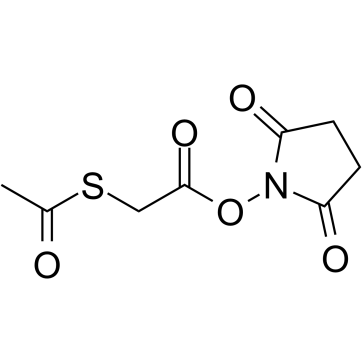N-琥珀酰亚胺基-S-乙酰硫基乙酸酯

N-琥珀酰亚胺基-S-乙酰硫基乙酸酯结构式

|
常用名 | N-琥珀酰亚胺基-S-乙酰硫基乙酸酯 | 英文名 | N-Succinimidyl-S-acetylthioacetate |
|---|---|---|---|---|
| CAS号 | 76931-93-6 | 分子量 | 231.226 | |
| 密度 | 1.5±0.1 g/cm3 | 沸点 | 337.3±44.0 °C at 760 mmHg | |
| 分子式 | C8H9NO5S | 熔点 | 84-89ºC | |
| MSDS | 中文版 美版 | 闪点 | 157.8±28.4 °C |
|
Protection of non-human primates against glanders with a gold nanoparticle glycoconjugate vaccine.
Vaccine 33(5) , 686-92, (2015) The Gram-negative Burkholderia mallei is a zoonotic pathogen and the causative agent of glanders disease. Because the bacteria maintain the potential to be used as a biothreat agent, vaccine strategies are required for human glanders prophylaxis. A rhesus mac... |
|
|
Tumor-targeted responsive nanoparticle-based systems for magnetic resonance imaging and therapy.
Pharm. Res. 31(12) , 3487-502, (2014) Design and synthesis of a tumor responsive nanoparticle-based system for imaging and treatment of various cancers.Manganese oxide nanoparticles (Mn3O4 NPs) were synthesized and modified with LHRH targeting peptide or anti-melanoma antibodies (cancer targeting... |
|
|
Self-assembled microbubbles as contrast agents for ultrasound/magnetic resonance dual-modality imaging.
Acta Biomater. 24 , 266-78, (2015) In this work, superparamagnetic self-assembled microbubbles (SAMBs) consisting of "Poly(acrylic acid)-Iron oxide nanoparticles-Polyamine" sandwich-like shells and tetradecafluorohexane cores were fabricated by a template-free self-assembly approach. The SAMBs... |
|
|
Use of antibody as carrier of oligomers of peptidomimetic alphavbeta3 antagonist to target tumor-induced neovasculature.
Bioconjug. Chem. 18(3) , 821-8, (2007) Sulfhydryl selective reactions were explored to conjugate oligomers of a peptidomimetic integrin alphavbeta3 antagonist, 4-[2-(3,4,5,6-tetrahydropyrimidine-2-ylamino)ethyloxy]benzoyl-2-(S)-aminoethylsulfonylamino-beta-alanine (IA) to monoclonal antibody (MoAb... |
|
|
Studies of the influence of different cross-linking reagents on the immune response against a B-epitope.
Bioconjug. Chem. 3(1) , 80-4, (1992) We have previously shown that the carrier polytuftsin obtained by polycondensation of tuftsin, a naturally occurring macrophage activator, increases significantly the antibody response against a linked B-epitope. In the present work, we have studied the influ... |
|
|
A sulfhydryl-reactive ruthenium (II) complex and its conjugation to protein G as a universal reagent for fluorescent immunoassays.
PLoS ONE 7(4) , e36086, (2012) To develop a fluorescent ruthenium complex for biosensing, we synthesized a novel sulfhydryl-reactive compound, 4-bromophenanthroline bis-2,2'-dipyridine Ruthenium bis (hexafluorophosphate). The synthesized Ru(II) complex was crosslinked with thiol-modified p... |
|
|
Chemical functionalization and bioconjugation strategies for atomic force microscope cantilevers.
Methods Mol. Biol. 751 , 381-400, (2011) Over the last decade, scanning probe microscopy (SPM) techniques, such as atomic force microscopy (AFM), have played an important role in a variety of biophysical research efforts. This straightforward technique has the capability to measure forces down to a ... |
|
|
A new reagent which may be used to introduce sulfhydryl groups into proteins, and its use in the preparation of conjugates for immunoassay.
Anal. Biochem. 132 , 68-73, (1983) A synthesis of the N-hydroxysuccinimide ester of S-acetylthioacetic acid is described. This material is stable when stored dry and has advantages over the currently available reagents used to introduce sulfhydryl groups into a variety of proteins. Proteins mo... |
|
|
Immunoliposomes as enzyme-carriers (immuno-enzymosomes) for antibody-directed enzyme prodrug therapy (ADEPT): optimization of prodrug activating capacity.
Pharm. Res. 13(4) , 604-10, (1996) Immuno-enzymosomes are tumor-specific immunoliposomes bearing enzymes on their surface. These enzymes are capable of converting relatively nontoxic prodrugs into active cytostatic agents. The enzyme beta-glucuronidase (GUS)4 was coupled to the external surfac... |
|
|
Development of a procedure for coupling the homing device glu-plasminogen to liposomes.
Biochim. Biophys. Acta 1117(3) , 258-64, (1992) The aim of this study was to find a suitable way of coupling the homing-device glu-plasminogen to the outside of liposomes. The described procedure is based on the reaction of thiol-groups introduced in the protein with thiol-reactive groups of the liposome. ... |